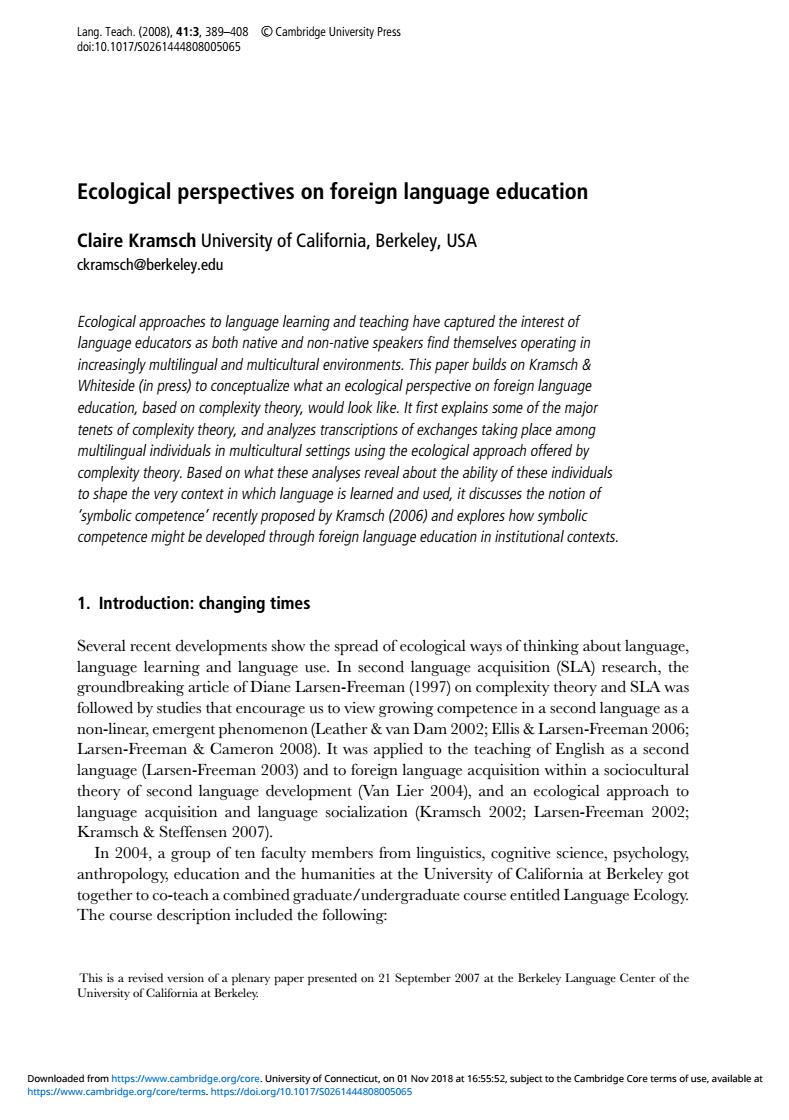正在加载图片...

8a62saoeshew Ecological perspectives on foreign language education Claire Kramsch University of California,Berkeley,USA ckramsch@berkeley.edu to anguage leaing and have captured the interest of language educators as both native and non-native speakers find themselves operating in increasingly multilingual and multicultural environments.This paper builds on Kramsch Whiteside (inpress)what per ctiveon foreign language education,based on complexity theory,would look like.It first explains some of the major tenets of complexity theory,and analyzes transcriptions of exchanges taking place among multilingual individuals in multicultural settings using the ecological approach offered by hery.these analyses reveal about the bility of to shape the very context in which language is learned and used,it discusses the notion of 'symbolic competence'recently proposed by Kramsch(2006)and explores how symbolic competence might be developed language education. 1.Introduction:changing times Several recent developments show the spread of ecological ways of thinking about language. language learning and language use.In second language acquisition(SLA)research,the groundbreaking article of Diane larsen-Freeman (1997)on complexity theory and sLA was followed by studies that encourage us to view growing competence in a second language as a non-linea emerg n 2002:Ellis Lars an2006 arsen-Freeman Cameron 2008).It was applied to the teaching of English as a secon language (Larsen-Freeman 2003)and to foreign language acquisition within a sociocultural theory of second language development (Van Lier 2004),and an ecological approach to language acquisition and language socialization (Kramsch 2002;Larsen-Freeman 2002; Kramsch Steffensen 2007). embers fro m linguistics. 、hology anthropology,education and the humanities at the University of Califorr nia at Berkeley got together to co-teach a combined graduate/undergraduate course entitled Language Ecology. The course description included the following: ted on 21 September 2007 at the Berkeley Language Center of the Lang. Teach. (2008), 41:3, 389–408 c Cambridge University Press doi:10.1017/S0261444808005065 Ecological perspectives on foreign language education Claire Kramsch University of California, Berkeley, USA ckramsch@berkeley.edu Ecological approaches to language learning and teaching have captured the interest of language educators as both native and non-native speakers find themselves operating in increasingly multilingual and multicultural environments. This paper builds on Kramsch & Whiteside (in press) to conceptualize what an ecological perspective on foreign language education, based on complexity theory, would look like. It first explains some of the major tenets of complexity theory, and analyzes transcriptions of exchanges taking place among multilingual individuals in multicultural settings using the ecological approach offered by complexity theory. Based on what these analyses reveal about the ability of these individuals to shape the very context in which language is learned and used, it discusses the notion of ‘symbolic competence’ recently proposed by Kramsch (2006) and explores how symbolic competence might be developed through foreign language education in institutional contexts. 1. Introduction: changing times Several recent developments show the spread of ecological ways of thinking about language, language learning and language use. In second language acquisition (SLA) research, the groundbreaking article of Diane Larsen-Freeman (1997) on complexity theory and SLA was followed by studies that encourage us to view growing competence in a second language as a non-linear, emergent phenomenon (Leather & van Dam 2002; Ellis & Larsen-Freeman 2006; Larsen-Freeman & Cameron 2008). It was applied to the teaching of English as a second language (Larsen-Freeman 2003) and to foreign language acquisition within a sociocultural theory of second language development (Van Lier 2004), and an ecological approach to language acquisition and language socialization (Kramsch 2002; Larsen-Freeman 2002; Kramsch & Steffensen 2007). In 2004, a group of ten faculty members from linguistics, cognitive science, psychology, anthropology, education and the humanities at the University of California at Berkeley got together to co-teach a combined graduate/undergraduate course entitled Language Ecology. The course description included the following: This is a revised version of a plenary paper presented on 21 September 2007 at the Berkeley Language Center of the University of California at Berkeley. https://www.cambridge.org/core/terms. https://doi.org/10.1017/S0261444808005065 Downloaded from https://www.cambridge.org/core. University of Connecticut, on 01 Nov 2018 at 16:55:52, subject to the Cambridge Core terms of use, available at